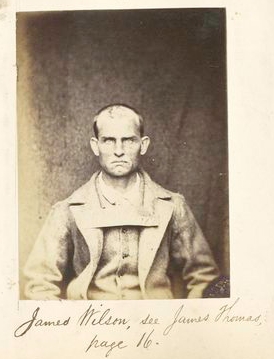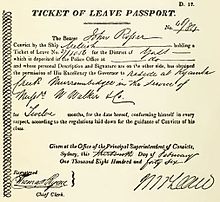Life imprisonment is any sentence of imprisonment under which the convicted individual is to remain incarcerated for the rest of their natural life. Crimes that result in life imprisonment are considered extremely serious and usually violent. Examples of these crimes are murder, torture, terrorism, child abuse resulting in death, rape, espionage, treason, illegal drug trade, human trafficking, severe fraud and financial crimes, aggravated property damage, arson, hate crime, kidnapping, burglary, robbery, theft, piracy, aircraft hijacking, and genocide.

Penal transportation was the relocation of convicted criminals, or other persons regarded as undesirable, to a distant place, often a colony, for a specified term; later, specifically established penal colonies became their destination. While the prisoners may have been released once the sentences were served, they generally did not have the resources to return home.
A pardon is a government decision to allow a person to be relieved of some or all of the legal consequences resulting from a criminal conviction. A pardon may be granted before or after conviction for the crime, depending on the laws of the jurisdiction.

Parole, also known as provisional release, supervised release, or being on paper, is a form of early release of a prison inmate where the prisoner agrees to abide by behavioral conditions, including checking-in with their designated parole officers, or else they may be rearrested and returned to prison.

William Redfern was the Surgeon’s First Mate aboard HMS Standard during the May 1797 Nore mutiny, and at a court martial in August 1797 he was sentenced to death for his involvement. His sentence was later commuted and in 1801 he was transported to New South Wales and assigned as an assistant to the Norfolk Island hospital. In this post he demonstrated the medical skills that enabled him to become one of the colony’s most revered physicians and a pioneer in public health. Redfern advocated major reforms to sanitary conditions aboard convict ships and this significantly reduced the morbidity rates of convicts arriving in NSW. Later in life he became a highly successful farmer, bank director and an emancipist rights activist.

The Correctional Service of Canada, also known as Correctional Service Canada or Corrections Canada, is the Canadian federal government agency responsible for the incarceration and rehabilitation of convicted criminal offenders sentenced to two years or more. The agency has its headquarters in Ottawa, Ontario.
Freedom of movement, mobility rights, or the right to travel is a human rights concept encompassing the right of individuals to travel from place to place within the territory of a country, and to leave the country and return to it. The right includes not only visiting places, but changing the place where the individual resides or works.
In Canada and England and Wales, certain convicted persons may be designated as dangerous offenders and subject to a longer, or indefinite, term of imprisonment in order to protect the public. Dangerousness in law is a legal establishment of the risk that a person poses to cause harm. Other countries, including Denmark, Norway, and parts of the United States have similar provisions of law.
A certificate of freedom was a government issued document given to a convict in one of the Australian penal colonies at the end of the convict's sentence. That stated that the ex-convict had been restored "to all the rights and privileges of free subjects", effectively now a free person, and could seek out employment or leave the colony.
In the English and British tradition, the royal prerogative of mercy is one of the historic royal prerogatives of the British monarch, by which they can grant pardons to convicted persons. The royal prerogative of mercy was originally used to permit the monarch to withdraw, or provide alternatives to, death sentences; the alternative of penal transportation to "partes abroade" was used since at least 1617. It is now used to change any sentence or penalty. A royal pardon does not overturn a conviction.
An emancipist was a convict sentenced and transported under the convict system to Australia, who had been given a conditional or absolute pardon. The term was also used to refer to those convicts whose sentences had expired, and might sometimes be used of free settlers who supported full civil rights for emancipated convicts.

The convict era of Western Australia was the period during which Western Australia was a penal colony of the British Empire. Although it received small numbers of juvenile offenders from 1842, it was not formally constituted as a penal colony until 1849. Between 1850 and 1868, 9,721 convicts were transported to Western Australia on 43 convict ship voyages. Transportation ceased in 1868, at which time convicts outnumbered free settlers 9,700 to 7,300, and it was many years until the colony ceased to have any convicts in its care.
In England and Wales, life imprisonment is a sentence that lasts until the death of the prisoner, although in most cases the prisoner will be eligible for parole after a minimum term ("tariff") set by the judge. In exceptional cases a judge may impose a "whole life order", meaning that the offender is never considered for parole, although they may still be released on compassionate grounds at the discretion of the home secretary. Whole life orders are usually imposed for aggravated murder, and can only be imposed where the offender was at least 21 years old at the time of the offence being committed.
William Chopin was a convict transported to colonial Western Australia. After gaining his ticket of leave he worked as a chemist and later as a provider of illicit abortions.

The Parole Board of Canada is the Canadian government agency that is responsible for reviewing and issuing parole and criminal pardons in Canada. It operates under the auspices of Public Safety Canada.
In judicial practice, back-to-back life sentences, also called consecutive life sentences, are two or more consecutive life sentences given to a convicted felon. This practice is used to ensure the felon will never be released from prison.
In the United States, life imprisonment is the most severe punishment provided by law in states with no valid capital punishment statute, and second-most in those with a valid statute. According to a 2013 study, one of every 2,000 prison inhabitants of the U.S. were imprisoned for life as of 2012.
Robert Sidaway, a convict of the First Fleet, was transported to Australia for stealing in 1788. Robert is known for being baker for the British Marines of Sydney and opening the first theatre in Sydney in 1796.
Life imprisonment in Canada is a criminal sentence for certain offences that lasts for the offender’s life. Parole is possible, but even if paroled, the offender remains under the supervision of Corrections Canada for their lifetime, and can be returned to prison for parole violations.







